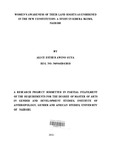| dc.description.abstract | Land in Kenya is an emotive issue since agriculture and farming is the main economic
activity in the country. Most women in Kenya depend on farming as a source of lively hood and yet women have not enjoyed security of tenure since the colonial period. However, the
new Kenyan constitution which was promulgated in 2010 has very good provisions that cater
for gender issues especially with regard to women's land and property rights. The general objective of this study was to establish the level of awareness among women of these provisions. The study sought to examine the problems women face with regard to land rights.
The study was confined only to women in Kibera Slums, in the city of Nairobi.
The research targeted 100 respondents who live in Makina and Kianda Villages in Kibera. Convenient sampling was used to select the individuals and the study was guided by the empowerment theory. Both Primary and secondary methods of data collection were used to garner quantitative and qualitative data. The survey was the main instrument of data collection and the technique made use of a standard questionnaire with both open and close ended questions. This was supported by 4 Focus Group Discussions conducted using FGD topics. Documentary materials, through library research provided secondary data.
The study ascertained that Kenyan women faced many problems with regard to land rights including: discriminatory cultural laws which do not recognise that women should inherit land. The study also found a high level of lack of awareness of Kibera women on their land rights as enshrined in the new constitution. Nevertheless, they were aware of the provisions dealing with inheritance. With a high of ignorance about provisions in the new constitution that guarantee them land rights, Kenya women are unlikely to benefit in any meaningful way from these provisions. Rather than the constitution empowering women to own, control, and use land the same way men do, lack of awareness continues to disadvantage and render many women powerless.
The study concludes that Kenyan women face many problems on a daily basis with regard to land rights and ignorance of the provisions in the constitution that address this continues to disadvantage them. The study suggests that for the provisions on land rights in constitution to empower women both social, economically and politically, there is an urgent need for civic education to enlighten them about these provisions and the ways in which they can use them as a tool for their economic empowerment. | en |

